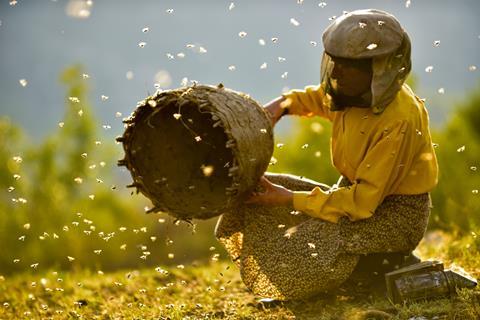A stark cinema-verité documentary captures a vanishing world

Dirs: Tamara Kotevska, Ljubomir Stefanov. Republic of Macedonia. 2019. 87 mins.
Hatidze Muratova is a beekeeper or, really, a bee hunter – most of the honey she collects is wild, the hives found in hollowed-out trees or mountain crevices. Hers is far from a sweet life; it’s difficult, sometimes dangerous work. Her days are bleak. And so is the film about her, Honeyland, which premieres at Sundance. More document than documentary – its own imdb.com page describes it as an “observational indigenous visual narrative” – it presents events without comment or context. Its artistic intentions are pure, but its commercial future seems limited.
Directors Tamara Kotevska and Ljubomir Stefanov resolutely resist the urge to dramatize
While budding anthropologists – or apiologists – may be sitting at attention from the start, the film refuses to win others over by compromising its spare, fly-on-the-wall, Frederick Wiseman aesthetic. We only hear what we overhear, see what we’re lucky enough to glimpse. This isn’t an audience-friendly ethnic adventure, like The Eagle Huntress, that works hard to involve us in some National Geographic adventure.
Yet it’s gorgeously photographed – often only by guttering candles – and its story still has a few things to offer patient viewers. There’s something fascinating, for example, in watching the middle-aged Muratova gather, strain and bottle her honey, trudging into the Macedonian capital of Skopje to sell it for 10 Euros per jar. It’s not much, but after all, how much money does she need? She lives with her elderly mother in a one-room, dirt-floored hut. There’s no power, no indoor plumbing. There aren’t even any neighbours; everyone else abandoned the village years ago.
Then that that fragile but functioning ecosystem is disturbed when a large fractious family of interlopers arrives. The nomads speak Turkish, like the Muratovas, and seem determined to settle down. Yet they have no respect for each other, or the land. They graze cattle, but lose most of them to neglect. They start fires to clear brush, but only end up endangering Hatidze’s bees. And then the family decides to get into the honey business themselves, on a grand scale.
The stage is set for a furious conflict, but directors Tamara Kotevska and Ljubomir Stefanov resolutely resist the urge to dramatize. They clearly had amazing, unquestioned access to this world, and these people. Yet their camera simply sits, and watches events unfold. Interviews are eschewed, of course, but along with them, any answers. Where did this new family come from? Why did they pick this forsaken place to settle? And where did everyone who used to live here go? (That some dialogue is subtitled badly, or not at all, doesn’t help.)
There are occasional flashes of life here, like Muratova’s splurge, on one of her rare trips to the city, on a bottle of chestnut hair dye. Or the time she finally asks her mother how is it that her family never arranged a marriage for her. (Your father turned all the men down, her mother replies.) But these are rare human moments in a rather distant film. And the result is a careful chronicle that, while staying true to its observational ethos, nonetheless, leaves plenty of questions – and, occasionally, its audience – behind.
Production companies: Apolo Media, Trice Films
International sales: Submarine info@submarine.com
Producer: Atanas Georgiev
Editing: Atanas Georgiev
Cinematography: Fejmi Dout, Samir Ljuma
Music: Foltin






![The Brightest SunScreen[Courtesy HKIFF]](https://d1nslcd7m2225b.cloudfront.net/Pictures/274x183/3/5/0/1448350_thebrightestsunscreencourtesyhkiff_312678.jpg)















![The Brightest SunScreen[Courtesy HKIFF]](https://d1nslcd7m2225b.cloudfront.net/Pictures/100x67/3/5/0/1448350_thebrightestsunscreencourtesyhkiff_312678.jpg)











